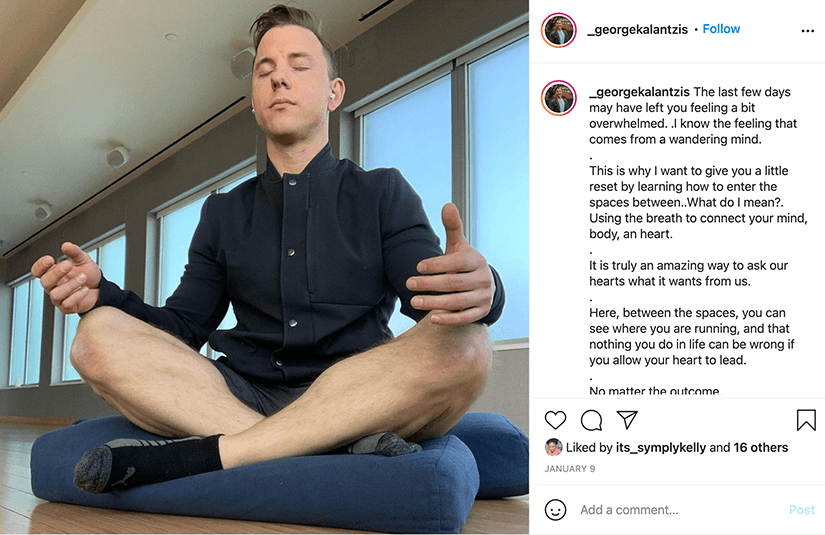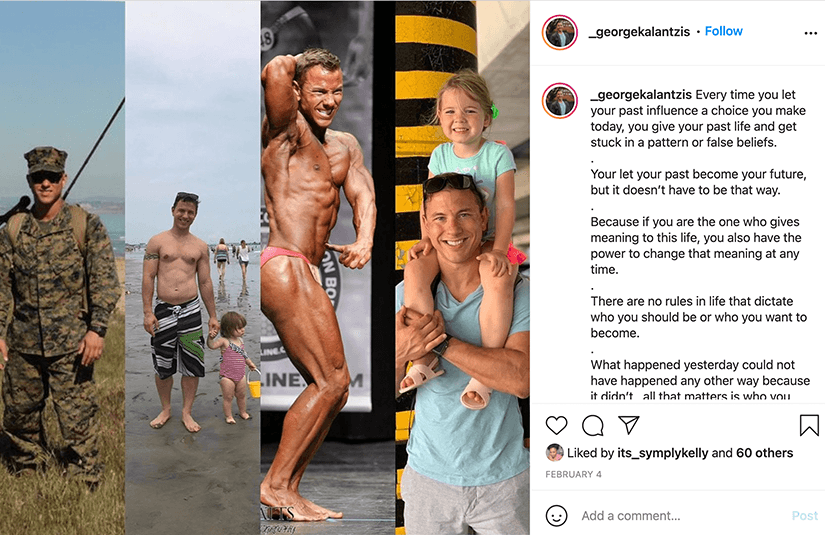I woke up when my car slammed into an Amazon truck.
My neck was stiff and I was bruised up. But I was alive.
Inside, though, I was dying.
Here’s what happened. I had just worked for 14 straight hours because my schedule was packed—that’s how I was earning six figures in just my fourth year as a trainer.
Driving home, I fell asleep at the wheel. My car coasted down a hill and hit the truck waiting at a stoplight.
Did the crash wake me up to the unsustainable life I was leading? Nope.
I’m a Marine. It’s not uncommon for me to push myself—my body, my mind, my life—to extremes.

As a Marine, the author is used to pushing himself to extremes.
Like many of you reading this, I trained clients from the early morning and well into the evening. I functioned on caffeine, car naps, and a few hours of actual sleep.
I was exhausted, depressed, and isolated from coworkers. I felt cynical and superior toward management, even though I was missing deadlines and losing clients.
I wasn’t home when I should’ve been and didn’t realize what I was becoming. I never stopped to ponder this because I was buzzed on adrenaline. I bounced between clients and pushed my body until I had nothing left.
Then my body shut down.
I’d just finished a heavy training session and went to grab a snack before my next client. But I couldn’t swallow. Or breathe.
The pain in my chest was so excruciating that I started vomiting and couldn’t stop.
I was hurried to the hospital.
My heart was fine. So was the rest of my body, physically.
But I was medically burned out. I still have trouble wrapping my head around that profound, counterintuitive revelation: My body couldn’t take any more.
As I write this, it still doesn’t make sense. It sounds made up.
This couldn’t happen to me—a Marine! A personal trainer!
But it did. I didn’t burn out because I’d lost my passion for training; far from it.
I burned out because I had no boundaries. The schedule I created provided no personal autonomy. The uneasy gaps between clients squeezed every bit of energy out of me until I had nothing left to give.
Classic trainer—giving so much to clients and ignoring myself.
Yes, my story is extreme. It included a wrecked marriage, drugs and alcohol, clinical depression, and a moment with a gun, thinking I could simply end the pain.
That’s probably not you. But burnout is all too common among anyone pursuing a passionate career like personal training.
In a landmark study from Rutgers University, researchers identified three key stress responses linked to burnout:
- an overwhelming sense of exhaustion
- feelings of cynicism and detachment
- a sense of professional ineffectiveness and lack of accomplishment
Those in caregiving careers tend to experience these symptoms the most.
I’m not trying to scare you, just warn you.
We need to be realistic about what many personal trainers face. Phony positive thinking doesn’t help.

Since you’re reading this article, I’m guessing some aspects of this job aren’t working out the way you intended. You’re not alone.
Try these guidelines—from someone who’s been there and back—to help preserve your energy so you can function at your best.
3 steps to prevent personal trainer burnout
1. Hire a therapist
I put this first because it helped me immensely, and because as personal trainers, we are uniquely positioned to see how it can help.
Think about it: Part of our job as trainers and coaches is hearing others’ problems and occasionally responding with life advice. Not all clients unload on us, but I’ve been impressed by how many do.
This affects you more than you think.
We trainers get paid for holding it together. Looks, confidence, knowledge, and style play a part in how clients perceive us.
We strive to create a kick-ass experience so clients will stick around. But what happens when you yourself start to feel discouraged, unfocused, and overwhelmed with client problems and your own?
The high standards we have for ourselves can lead to impossible demands on our mental health and self-worth. Hiding our feelings doesn’t help, so it may be tempting to talk about your problems with your clients. It’s better to hire a professional.
After my burnout, I tried therapy. I hesitated because I’d had trouble with a previous therapist when I was struggling in my personal life and losing clients.
But this time was different. Therapy gave me a safe place to process my emotions instead of taking it out on the gym floor.
What is therapy for? It’s to help you become aware of specific thoughts and issues so you can recognize and deal with them before things spiral.
It’s impossible to deal with them when your life is overloaded with inputs, like what happened to me.
We all face adversity in different ways. Therapy can prevent burnout because it’s proactive.
It’s like training and nutrition. You’re approaching health holistically.
(For more on the power of therapy, listen in to this podcast episode for personal trainers with mental health struggles.)
2. Get in touch with your body and mind

We spend the entire day telling others how to take care of themselves. But some of us are horrible at taking care of ourselves.
Instead of giving our body what it needs, we tend to push it in extreme workouts and diets. We feel like we have to. And whenever we feel like this, we end up losing ourselves even more.
What’s needed for career longevity and good health is a healthy relationship with your mind, body, and heart. Doing this lets others see you as human, and that’s crucial.
Your clients will stick around when they see how much you care and how you can relate to their lives.
Of course, many trainers are well in touch with themselves. But many personal trainers use their bodies like machines and walking billboards. This prevents us from getting out of our heads and into our bodies.
Sound a little woo-woo? Then you’re a candidate for a little test.
See if you can breathe deep. Focus on the sensations within your body as you read these words. Notice the smells and sounds around you. Become aware of everything that is happening right now.
What has called you here to read this article? Who is around you? What do you feel?
If you did that correctly, you just practiced “mindful reading.”
You’ve probably heard of mindful meditation, mindful eating, mindful breathing. Add reading.
You don’t have to meditate for mindfulness, although the cognitive benefits of increased meditation in life are insane. Trust me, I know.
Anything that gets you to be fully present and not distracted from what is going on around you is mindfulness. There’s a quote often attributed to Viktor Frankl that goes:

Think of that space as mindfulness.
As a daily practice, take 15 to 20 minutes to incorporate mindfulness in your life. Try meditation, journaling, yoga, mindful walking, or anything else that will get you to focus on the present moment.
3. Work less, recover more
It took me 20 years to figure this one out.
Too many of us go through life trying to do more. We wrongly gauge our worth by the time we spend training clients, obtaining certifications, and working on our craft.
Because you are paid for your time, you think more is better. You chase dollar signs.
The belief that a packed schedule makes you more money—and a better trainer—leads to uncertainty in your life.
Hard work is admirable. But there is a dark side to always scrambling to fill up a schedule.
How many times have you found yourself at the gym for 12 hours but only had four, five, or maybe six clients? On a good day, seven or eight?
That was me for most of my career. My “best” day was 10 clients.
I hear you—you’d kill for a 10-client day—but I was a zombie. My energy level and productivity sucked.
I spent most of my career with this mindset. As a result, looking back, I never had stability in my life because I never took time for myself.
(I also missed out on a lot of days with my young daughter. Now, when I have her on weekdays, I set hard limits on work, and on weekends with her I take at least one full day off.)

The author sets hard limits on work to make time for his daughter.
We’ve made personal training too complicated. The commercial gym schedule turns great coaches into robots instead of allowing them to be humans.
If you spend most of your life chasing external things (money, success, fame), you’ll never reach your potential.
That’s why it’s super important to know your financial numbers for survival—what Jonathan Goodman calls your Freedom Number. Knowing that helps you create your ideal day and week.
I never did this until my last year in the gym because I was chasing life on the surface. I was all about the knowledge, status, and money, and I forgot that I was the one in control of my life.
Toward the end of my days in the gym, I began to switch my schedule to the life I wanted to create. And that’s when my life improved all around.
I banged out the first draft to a book, left the gym, and started my own coaching business online. I now work fewer hours and have more freedom and happiness in my life.
Today I set yearly, quarterly, monthly, and weekly goals. I set a hard boundary when I am done for the day.
And just like training cycles, my work schedule changes according to my goals. It’s not based upon a scarcity mindset—the “never enough” trap.
Once you have designed this container for your life, it’s time to get serious about your life outside the gym.
Schedule recovery time like it’s your job (which it is). Make it a must-have in your life. It’s like a recovery day in your workout regimen.
What do you need to take care of yourself? Plan a weekend off from the gym. Reward yourself more for accomplishments. Get rid of negative people in your life.
The ideas are endless, and they do not include working out more or starting a diet. It’s about cultivating a sense of self-worth so you don’t get burned out.
Everyone has that point of no return. Make sure you know your limits. Know when you have to say no and take a break for a few days.
It might not be easy at first. You may encounter resistance from other trainers or management, but that’s okay.
Eventually, you will become more comfortable with who you are and align with why you became a trainer in the first place—to help others.
Once you do, you’ll never go back to being a slave in a gym. And you’ll be happier and healthier than ever.










